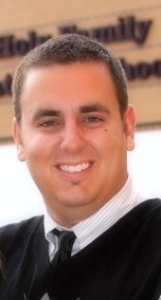 After completing his internship, Jeffrey Holko was hired as a disability specialist for Genesys Health Systems. Last year, he moved to a new position at Genesys, becoming a benefits specialist. Holko is currently close to graduating with a Master of Public Administration with a concentration in health care administration from UM-Flint, and was gracious enough to answer our questions about his undergraduate experience and professional growth so far.
After completing his internship, Jeffrey Holko was hired as a disability specialist for Genesys Health Systems. Last year, he moved to a new position at Genesys, becoming a benefits specialist. Holko is currently close to graduating with a Master of Public Administration with a concentration in health care administration from UM-Flint, and was gracious enough to answer our questions about his undergraduate experience and professional growth so far.
What is your job, and what kind of work does it involve?
While working as a disability specialist, I handled all employee leaves of absence: long-term and short-term disability, FMLA employee leave, worker’s compensation, etcetera. I assisted employees complete the process of applying for and returning from medical leave.
In July 2013, I moved to a new position within the health system. I am one of two benefits specialists that administer and regulate employee benefits for active and retired employees. I conduct presentations, during which I explain employee benefits to “new hires” within the health system (health insurance, dental and vision insurance, life insurance, and retirement benefits). While a lot of my work involves answering benefit-related questions via telephone and e-mail, I also get the chance to regularly interact with employees during one-on-one meetings in my office. Once a year, all Genesys Health System employees are required to update their benefits selections. During this time, I serve as a primary communicator between the human resources department and employees.
Describe a typical day for you.
One of the things I enjoy most about my job is that no two days are the same. Every employee represents a unique situation, which means every benefits case requires different action. A “typical” day for me generally begins by responding to e-mails and voicemails from active employees and retirees regarding their benefits. I spend a lot of time acting as a “middle-man” of sorts between employees and outside benefit providers. As is common in many organizations, health insurance tends to be the most complicated employee benefit and requires the vast majority of my time. Throughout the course of a typical day, I meet directly with anywhere from 20 to 40 employees. I enjoy being able to interact with a lot of different people on a daily basis.
How does your work relate to what you learned in your program?
A lot of my work incorporates at least some component of what I learned in the Health Care Administration program. The curriculum was accurate in terms of what to expect in a healthcare human resources environment. Policy making, staffing, and legal issues in healthcare were especially helpful in preparing me for the work I do on a daily basis. Additionally, any and all courses requiring in-class presentations and group work were all exceedingly beneficial. While they might not have been my favorite at the time, they allowed me to easily step into the role of conducting meetings and collaborating with co-workers. Throughout the program, I was forced to come out of my shell and gain confidence during interaction with others. Overall, I would say the emphasis on effective communication was the most beneficial aspect of the Health Care Administration program as it relates to my current position.
What advice do you have for students and fellow alumni of the program?
My advice to all students and fellow alumni is to be confident in your ability and focus on improving communication skills. In the human resources department, we often see college graduates with excellent grades and mechanical skills on their resume, but many lack the ability communicate effectively. Essentially, being a “people person” matters. Set yourself apart from other applicants by practicing interview skills and self-confidence. Employers appreciate someone who behaves assertively, even in uncomfortable situations. Be the type of person who is first to reach out for a handshake and introduce yourself. Simple actions such as these can go a long way. Overall, take advantage of the communication opportunities associated with the program and learn to effectively interact with friends and strangers alike.
Want to tell us your story? Submit it here!